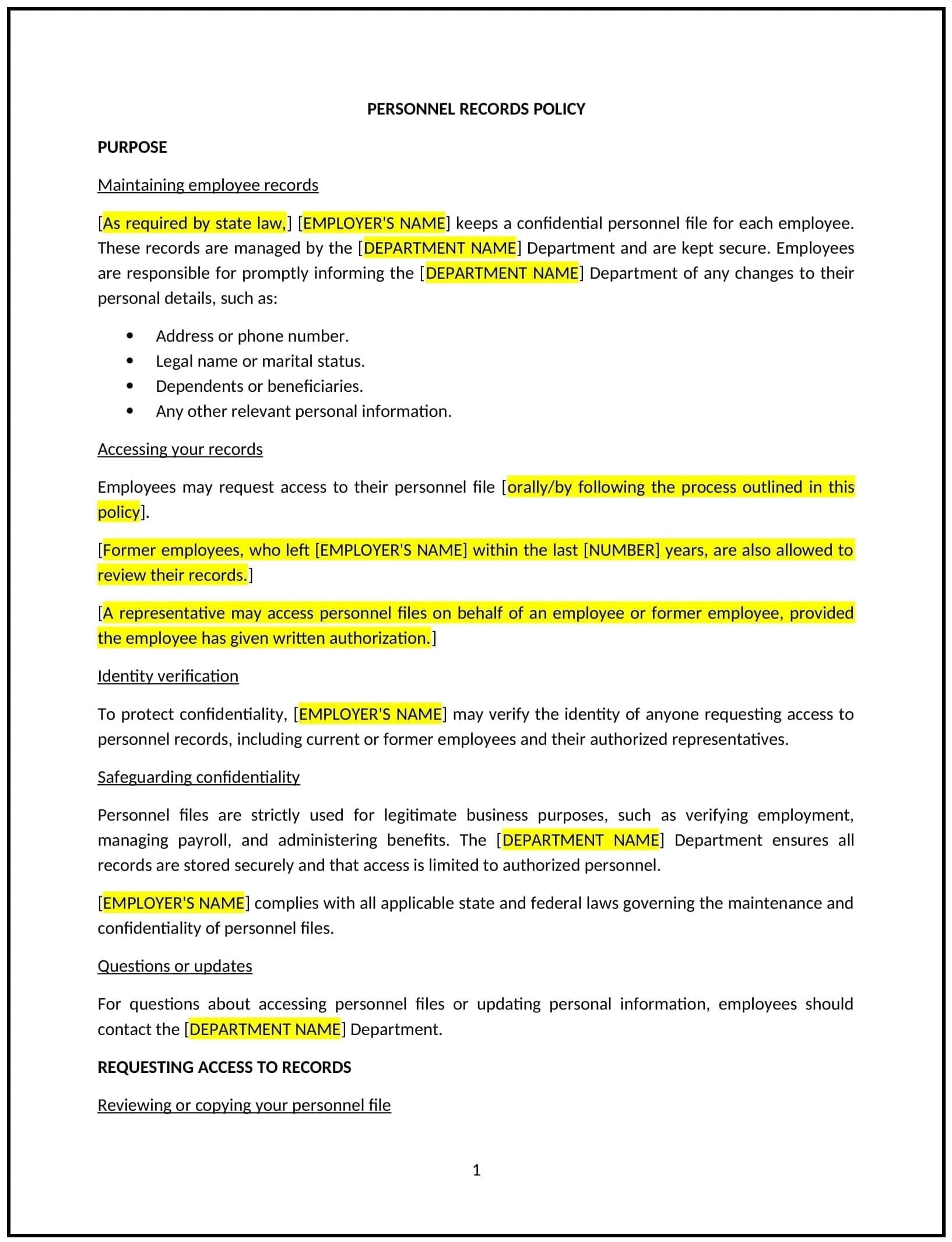Got contracts to review? While you're here for policies, let Cobrief make contract review effortless—start your free review now.

Customize this template for free
Personnel records policy (Michigan)
A personnel records policy outlines the procedures for managing employee records within Michigan businesses. This policy specifies how personnel records should be created, maintained, accessed, and protected to ensure confidentiality, accuracy, and compliance with Michigan state laws and federal regulations. The policy covers employee information such as hiring documents, performance evaluations, disciplinary records, and other personal or professional data collected during employment.
By adopting this policy, businesses can maintain organized, secure, and compliant employee records, protect sensitive information, and foster transparency and trust with employees.
How to use this personnel records policy (Michigan)
- Define what constitutes personnel records: Specify the types of documents and information considered part of an employee’s personnel record, including hiring records, contracts, performance reviews, medical records (if applicable), disciplinary actions, and any other information that pertains to employment.
- Set guidelines for maintaining records: Establish how and where personnel records will be stored (e.g., physical filing systems, secure digital databases) and how long records will be retained. Specify procedures for maintaining accurate and up-to-date information.
- Define access to personnel records: Limit access to personnel records to authorized individuals, such as HR personnel or managers with a legitimate business need to review the records. Outline who can access these records and under what circumstances.
- Ensure confidentiality: Emphasize the importance of keeping employee records confidential, and outline security measures to protect sensitive information from unauthorized access, theft, or loss.
- Specify the employee’s rights: Outline employees' rights regarding their personnel records, such as the right to inspect their records upon request, the right to request corrections to inaccuracies, and the right to know who has accessed their records.
- Address third-party access: Provide guidelines for disclosing employee records to third parties, such as government agencies, auditors, or legal entities, ensuring that disclosures are made only when required by law or with the employee’s consent.
- Outline retention and disposal procedures: Establish how long personnel records will be retained and the procedures for securely disposing of records that are no longer needed, including shredding physical documents and deleting digital files.
- Ensure compliance with Michigan state and federal laws: Ensure that the policy complies with relevant laws, including the Michigan Personnel Record Privacy Act and the Fair Credit Reporting Act (FCRA), and any other applicable regulations regarding employee records.
- Review and update regularly: Periodically review and update the policy to ensure it remains compliant with changing Michigan state laws, federal regulations, and business practices.
Benefits of using this personnel records policy (Michigan)
This policy provides several key benefits for Michigan businesses:
- Promotes legal compliance: The policy helps businesses comply with Michigan state laws and federal regulations related to personnel records, ensuring that they meet legal requirements regarding data protection and employee privacy.
- Enhances organizational efficiency: By establishing a structured process for maintaining and accessing employee records, businesses can streamline their HR operations, making it easier to track employee history and performance.
- Protects employee privacy: By safeguarding personal and sensitive information, businesses build trust with their employees and protect their privacy rights.
- Reduces legal risks: Clear guidelines for handling employee records help reduce the risk of legal disputes related to wrongful access, incorrect information, or mishandling of personal data.
- Improves transparency: Providing employees with access to their records helps promote transparency and fairness, fostering a more positive and trusting relationship between employees and the business.
- Supports business continuity: A clear and organized system for managing personnel records ensures that critical employee information is readily accessible when needed and protected from loss or damage.
Tips for using this personnel records policy (Michigan)
- Communicate the policy clearly: Ensure all employees are aware of the personnel records policy by including it in the employee handbook, during onboarding, and through periodic reminders about employee record management.
- Train HR staff: Provide training to HR personnel on the proper handling of employee records, including maintaining confidentiality, providing access, and following retention and disposal procedures.
- Maintain regular audits: Conduct periodic audits of employee records to ensure they are being maintained according to the policy and that the information is accurate and up-to-date.
- Protect records from unauthorized access: Implement security measures, such as password protection, encryption, and restricted access to sensitive records, to prevent unauthorized access to personnel files.
- Ensure employees' rights: Inform employees of their rights to access their records, request corrections, and understand who has viewed their records. Provide a straightforward process for employees to exercise these rights.
- Review and update regularly: Regularly review the policy to ensure it reflects changes in Michigan state laws, federal regulations, and best practices for managing employee records. Keep the policy aligned with the business’s evolving needs.